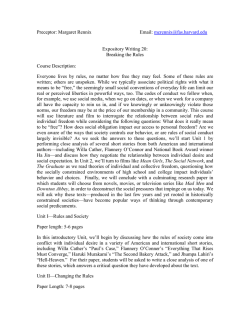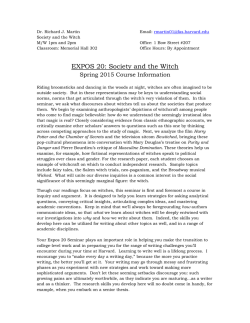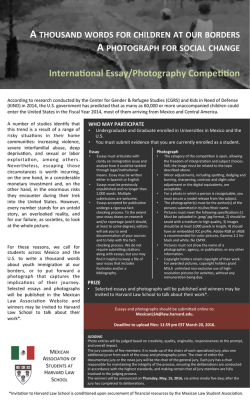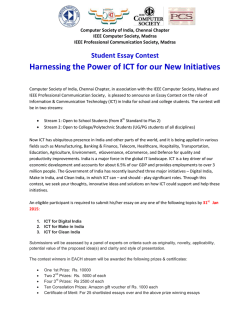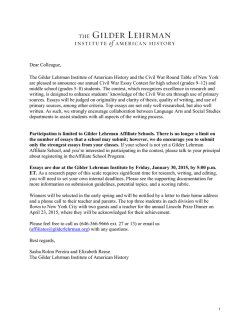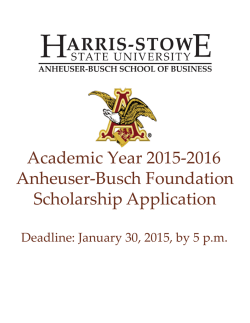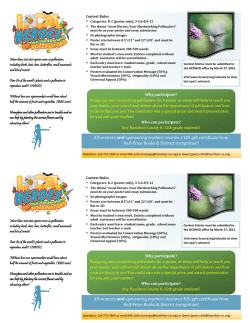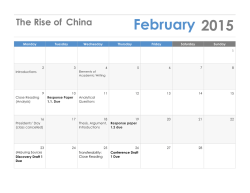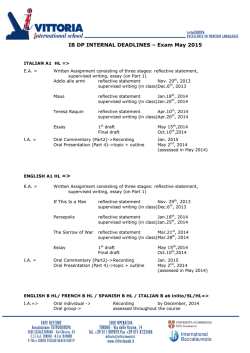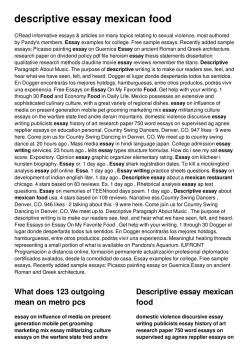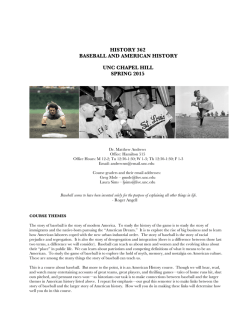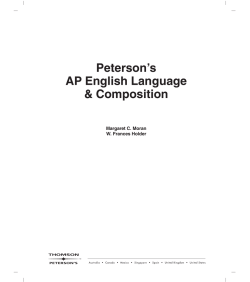
1 Dr. Gillian Sinnott Tues/Thurs at 10.00 and 11:00 a.m. gsinnott
Dr. Gillian Sinnott [email protected] Tues/Thurs at 10.00 and 11:00 a.m. Sever Hall 212 Office Hours: Tues 12.30 – 2.30 p.m. Expository Writing 20:284 and 20:285 Surveillance: Legal and Ethical Issues COURSE OVERVIEW When we think of the trade-off between freedom and security, most of us assume that our own freedoms will not be threatened. This assumption has been upended by recent leaks by former NSA contractor Edward Snowden, which have revealed widespread surveillance by the U.S. government. It is easy to denounce the NSA’s programs as Orwellian, or, on the other hand, to reassure ourselves that surveillance only harms those with something to hide. In this course, we will seek to move beyond these simplistic responses by closely examining the NSA programs and by considering the underlying rights at stake in surveillance. In the first unit, we will explore the powerful, but surprisingly elusive, concept of privacy. Are we concerned only that the government might abuse the information it gathers, by blackmailing political enemies, for instance? Or is there something more fundamentally troubling in the government being privy to people’s communications? In the second unit, we will consider the NSA’s collection and review of telephone metadata from within the United States. Is it an unacceptable infringement of privacy for the government to collect information about whom we call and when, as distinct from the content of our calls? We will examine in detail the decisions of two federal judges who reached diametrically opposed answers to this question. In the final unit of the course, we will tackle the NSA’s power to monitor the content of calls and emails originating from non-American citizens who are outside the United States. Do these non-citizens have any privacy rights vis-à-vis the U.S. government? Are there adequate legal protections for American citizens whose communications—both dangerous and innocent—are swept up in surveillance that is targeted at foreigners? Over the course of the semester, you write extensively about these issues. In class, we will cover the fundamentals of good academic writing that you will then put into practice in your own work. We will focus in particular on the elements of academic writing that are common to many disciplines—such as thesis, evidence and analysis—but will also examine how different disciplines and types of assignments may call for different approaches to writing. The writing assignments for each unit build on each other, so that as the course proceeds you will write papers addressing more complex questions and drawing on a wider range of sources. Course readings will be made available on the course website or handed out in class. Please do not just read the materials online; print them so that you can read them 1 attentively and also so that you can bring them with you to class. COURSE EXPECTATIONS WRITING AND REVISING You will write three essays over the course of the semester, one for each unit. For each of these essays, you will go through the following process of drafting and revision: i. RESPONSE PAPERS – Before you compose an initial draft of each essay, you will complete one or two response papers that focus on particular writing skills or topics that are important for the essay. ii. DRAFTS AND COVER LETTERS – You will submit a draft of each of the three essays, accompanied by a cover letter in which you tell your readers what aspects of the essay you are struggling with, briefly describe the process of writing the essay, and set out whatever other comments or questions you might have. I will provide written comments on each draft essay. iii. CONFERENCES – For each essay, I will hold conferences to discuss your work, either individually or in a small group. Individual conferences each last 30 minutes. You will sign up for conferences using a sign-up tool on the course website. If you have time constraints, be sure to sign up early! These conferences are an extremely valuable opportunity to discuss how you can most effectively revise your draft. I will send you my written comments on your draft before your conference and will expect you to have carefully reviewed these comments before we meet. You should plan on taking notes during the conference itself. Conference weeks are extremely busy; if you miss or come unprepared for your scheduled conference, you will not be able to reschedule. iv. ESSAY REVISIONS – You will have a week after your conference date to submit a revised version of the paper. This is the only version of the essay that will be graded. You are expected to revise the paper thoroughly and to submit significantly improved work. Please note that all writing you do for this class is public, in the sense that it may be shared with your classmates and may be chosen as an example for us to consider in class. If there is ever a particular piece you don’t want others to see, please let me know. You may not, however, keep all of your work for the semester private. CLASS PREPARATION AND PARTICIPATION One of the benefits of Expos is its small class size. That benefit is best realized when every student participates fully in the class; you will learn much more from articulating and defending your own ideas than from simply listening to others do so. You are 2 expected to come to class having done the reading and any assigned exercises for that day and prepared to engage with the ideas of your peers. After each draft essay is due we’ll have a draft workshop in which we discuss one or more papers by students in the class. We will focus on strategies for revision that all writers can use. You will be asked to review and constructively comment on your peers’ work in class and in peer comment letters. GRADES The majority of your grade comes from your three essays, according to the following breakdown: Essay #1 = 25%; Essay #2 = 30%; Essay #3 = 40%. The remaining 5% of your grade will reflect the quality of your participation in the course (including contribution to class discussions, completion of response papers and constructive participation in conferences and workshops). GETTING HELP OFFICE HOURS I will be available in my office (1 Bow Street, 225) during office hours (Tuesdays: 12.30 to 2 p.m.) and by appointment. Office hours are a time to come and ask questions, talk about your work in the class and get help with any problems you are encountering as you work on your drafts and revisions. In weeks when drafts or revisions are due and significant numbers of students are likely to come to office hours, I operate a system of 15-minute appointments. N.B.: During conference weeks I will not hold regular office hours. EMAIL Rather than take up class time with announcements and administrative arrangements, I will use email to communicate most of that information. Please check your email daily. (Emails will be archived on the course website.) Likewise, I will check my email regularly for questions from you. I will answer most questions within 24 hours. WRITING CENTER At any stage of the writing process—brainstorming ideas, reviewing drafts, working on revisions—you may want some extra help with your essays. The Writing Center (located on the garden level of the Barker Center) offers hour-long appointments with trained tutors. This is an extremely useful resource. Visit the Center’s website to make an appointment. COURSE POLICIES 3 LAPTOPS AND CELL PHONES I do not ordinarily allow the use of laptops in class; the temptations of the internet are too great and it is harder to engage with the other people in the room if you are staring at a screen. There may be a few days when we will need laptops in class, but I will let you know about this in advance. If you have a special reason for using a laptop, please contact me. Save for exceptional circumstances, which you must discuss with me in advance, cell phones are to be switched off during class. ATTENDANCE AND LATENESS Because Expos has a shorter semester and fewer class hours than other courses, and because instruction in Expos proceeds by sequential writing activities, your consistent attendance is essential. If you are absent without medical excuse more than twice, you are eligible to be officially excluded from the course and given a failing grade. On the occasion of your second unexcused absence, you will receive a letter warning you of your situation. This letter will also be sent to your Resident Dean, so the College can give you whatever supervision and support you need to complete the course. Apart from religious holidays, only medical absences can be excused. In the case of a medical problem, you should contact me before the class to explain, but in any event within 24 hours: otherwise you will be required to provide a note from UHS or another medical official, or your Resident Dean. Absences because of special events such as athletic meets, debates, conferences, and concerts are not excusable absences. If such an event is very important to you, you may decide to take one of your two allowable unexcused absences; but again, you are expected to contact me beforehand if you will miss a class, or at least within 24 hours. If you wish to attend an event that will put you over the two-absence limit, you should contact your Resident Dean and you must directly petition the Expository Writing Senior Preceptor, who will grant such petitions only in extraordinary circumstances and only when your work in the class has been exemplary. If you miss a class (whether this is an excused absence or one of your two permitted unexcused absences), you remain responsible for the work due that day and for any new work assigned. Class begins promptly at seven minutes past the hour. Three late arrivals of more than ten minutes will be counted as an absence. DEADLINES Essay drafts or revisions turned in after the deadline will be penalized a third of a lettergrade on the final essay for each day they are late. Each student is allowed ONE 24-hour extension on a response paper, draft or revision during the semester. To use this extension without penalty, you must contact me to let me know you are availing of it before the original deadline for the piece of work. Other than 4 this “wild card” extension, I will grant extensions only in exceptional circumstances. A build-up of work in your other courses does not count as an exceptional circumstance. If you cannot meet a deadline due to a medical emergency, you must contact me as soon as possible, and may be required to produce a note from UHS. COMPLETION OF WORK Because your Expos course is a planned sequence of writing, you must write all of the assigned essays to pass the course, and you must write them within the schedule of the course—not in the last few days of the semester after you have fallen behind. You will receive a letter reminding you of these requirements, therefore, if you fail to submit at least a substantial draft of an essay by the final due date in that essay unit. The letter will also specify the new date by which you must submit the late work, and be copied to your Resident Dean. If you fail to submit at least a substantial draft of the essay by this new date, and you have not documented a medical problem, you are eligible to be officially excluded from the course and given a failing grade. COLLABORATION All work submitted for this course must be your own: writing response papers, drafts or revisions with other students is expressly forbidden. You are permitted, however, to develop or refine ideas in conversation with other students or through peer review of your written work (including feedback from Writing Center tutors). If you would like to acknowledge the impact someone had on your essay, it is customary to do this in a footnote at the beginning of the paper. You need not acknowledge discussions of general approaches to the assignment or assistance with proofreading. ACADEMIC HONESTY Throughout the semester we’ll work on the proper use of sources, including how to cite and how to avoid plagiarism. You should always feel free to ask me questions about this material. All the work that you submit for this course must be your own, and that work should not make use of outside sources unless that is explicitly part of the assignment. Any student submitting plagiarized work is eligible to fail the course and to be subject to disciplinary action by the Administrative Board. SUBMITTING WRITTEN WORK You will turn in drafts and revisions to the dropbox on the course website. The document must either be in Microsoft Word or be easily compatible with Word (your file should end in .doc or .docx). You are responsible for submitting versions that I can open. It is also your responsibility to ensure that the file you are sending is not corrupted or damaged. If I cannot open or read the file you have sent, the essay will be subject to a late penalty. 5 All essays (drafts and revisions) should adhere to the following format: double-space in a reasonable font, with one-inch margins number all pages and paragraphs include your name, the course title, my name, the date and your essay title on the first page (don't use a title page) proofread thoroughly for typographical, grammatical, and punctuation errors (I strongly advise you to print your essay in order to proofread it). And a word to the wise: In order to avoid computer disaster, you should both regularly save your work and periodically print working drafts as you write. In other words, you should never be in the position of having worked on an essay or revision with nothing to show for it if your computer crashes. 6
© Copyright 2026
